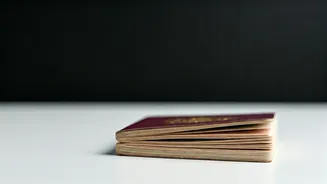Never Lose Sight
The first and most important rule is to always keep your passport within sight. Treat it as you would your wallet or phone. Never leave it unattended in public
places like restaurants, hotel rooms, or on the beach. Keep it in a secure location, like a money belt or a secure pocket in your bag. Losing your passport can lead to significant delays and inconvenience, including the need to obtain a temporary travel document from your embassy or consulate, which is a complicated and time-consuming process. Additionally, the unauthorized use of your passport for illegal activities could have severe legal consequences.
Avoid Photocopying Excessively
While it's good to have a photocopy of your passport for emergencies, avoid carrying multiple copies or making it readily available. Limit the number of people and institutions you share the copy with. The risk here is the potential for identity theft. Photocopies can fall into the wrong hands and be used to create fraudulent documents or open accounts in your name. Store your passport copy securely, separate from your actual passport. If you do need to provide a copy, only do so when absolutely necessary and make sure the recipient is trustworthy. Consider blurring out sensitive information, such as your passport number, on the copy if it's not strictly needed.
Don't Lend It Out
Never, under any circumstances, lend your passport to anyone. Your passport is a personal document and is only valid for your use. Allowing someone else to use it could lead to severe legal issues, including being accused of aiding illegal immigration or fraud. It could also lead to a complete denial of entry into a country. Furthermore, if the person using your passport gets into trouble, it can severely impact your own travel prospects. The passport is a symbol of your identity, and sharing it with someone else means you are also sharing your right to travel securely and legally.
Steer Clear of Damage
Treat your passport with care to avoid any damage. It's a valuable document and must be in good condition to be accepted by border control and immigration officials. Avoid bending, tearing, or getting it wet. Water damage can make the information unreadable or damage the security features. Keep it in a passport holder to protect it from the elements and wear and tear. Damaged passports can be rejected at the border, leading to travel delays or refusal of entry. If your passport is damaged, you will likely need to apply for a replacement, a process that can take some time and effort, especially if you're already traveling.
Avoid Unauthorized Alterations
Do not attempt to alter your passport in any way. This includes adding notes, stickers, or any other modifications. Unauthorized alterations will invalidate your passport and render it useless for travel. Border officials are trained to spot any kind of alteration, and if they detect it, it could lead to suspicion and potential detention. Even seemingly harmless additions could be seen as an attempt to falsify your identity. Keep your passport clean and free from any markings except for official stamps and visas. Always use passport-sized photographs when requested to avoid any issues with border authorities.
Don't Leave It Around
Never leave your passport unattended in public places. This is a crucial security measure. Be cautious about the surroundings, especially in crowded areas like train stations, airports, or tourist hotspots. Consider a secure money belt or a neck pouch to keep your passport close to your person. Always be vigilant about your belongings and avoid displaying your passport openly when not needed. Leaving your passport in a public space can easily lead to its loss or theft, and the consequences range from travel delays to the potential for identity theft and other serious issues.
Report Immediately!
If your passport is lost or stolen, report it immediately to the local police and your country’s embassy or consulate. Time is of the essence, as the longer you wait, the higher the risk of identity theft or misuse. Provide them with as much detail as possible about the loss, including when and where it happened. The authorities will help you to get a replacement passport and may also assist with any legal procedures. Reporting the loss promptly will protect you against potential misuse of your passport and will help in getting a new one quickly so you can continue your travels without much interruption.
Be Wary of Scams
Be alert for scams that target passport holders. Be especially cautious of unsolicited emails or phone calls claiming to be from your embassy or immigration services, asking for your passport details or payment. Never provide personal information or make payments to any suspicious source. Always verify the authenticity of any request by contacting your embassy or relevant government agency directly. Protect your passport number and details, treating them as confidential information. Avoiding these scams is critical for safeguarding your passport from misuse and protecting your personal and financial information.













